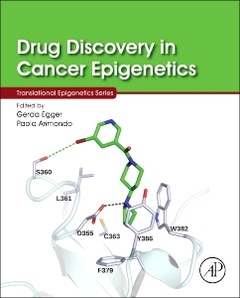Drug Discovery in Cancer Epigenetics
Coordonnateurs : Egger Gerda, Arimondo Paola

Drug Discovery in Cancer Epigenetics is a practical resource for scientists involved in the discovery, testing, and development of epigenetic cancer drugs. Epigenetic modifications can have significant implications for translational science as biomarkers for diagnosis, prognosis or therapy prediction. Most importantly, epigenetic modifications are reversible and epigenetic players are found mutated in different cancers; therefore, they provide attractive therapeutic targets. There has been great interest in developing and testing epigenetic drugs, which inhibit DNA methyltransferases, histone modifying enzymes or chromatin reader proteins. The first few drugs are already FDA approved and have made their way into clinical settings. This book provides a comprehensive summary of the epigenetic drugs currently available and aims to increase awareness in this area to foster more rapid translation of epigenetic drugs into the clinic.
I. Introduction
1: Basic Epigenetic Mechanisms and Phenomena
2: Cancer Epigenetics
II. Methods and Tools for Epigenetic Drug Development
3: Drug Discovery Methods
4: Preclinical Cancer Models with the Potential to Predict Clinical Response
5: Discovery of Biomarkers for Drug Development
6: Networks and Consortia for Epigenetic Drug Discovery
III. Classes of Epigenetic Drugs
7: DNA Methyltransferase Inhibitors
8: Small Molecule Inhibitors of Histone Deacetylases and Acetyltransferases as Potential Therapeutics in Oncology
9: Targeting histone methylation. The development of selective methyltransferase and demethylase inhibitors
10: Bromodomains as Anti-Cancer Targets
11: Epigenetic Readers Interpreting the Lysine Methylome – Biological Roles and Drug Discovery
12: Non coding RNAs: Clinical and Therapeutic Applications
IV. Clinical Implications of Epigenetic Therapy
13: Clinical Applications of Epigenetic Drugs
14: Efficacy of Combined Epigenetic Therapies
15: Predicting and Monitoring Responses to Epigenetic Drugs
16: Episensitization: A New Word for A New Concept
17: The Emerging Potential for Epigenetic Therapeutics in Non-Cancer Disorders
scientists of the academic and industrial sector aiming to test and develop epigenetic cancer drugs; oncologists; geneticists; clinical researchers; clinicians interested in adopting clinical trial drugs.
Dr. Paola Barbara Arimondo is the Director of the Unité de Service et de Recherche (USR n°3388) entitled “Epigenetic Targeting of Cancer –ETaC-“ which brings together basic and applied research – a joint laboratory of the Institut de Recherche Pierre Fabre (IRPF) and the CNRS. She is extremely experienced in researching regulatory pharmaceuticals and cancer epigenetics.
- Highlights the potential of epigenetic alterations in cancer for drug development
- Covers the tools and methods for epigenetic drug discovery, preclinical and clinical testing, and clinical implications of epigenetic therapy
- Provides important information regarding putative epigenetic targets, epigenetic technologies, networks and consortia for epigenetic drug discovery and routes for translation
Date de parution : 02-2016
Ouvrage de 498 p.
19x23.3 cm
Thèmes de Drug Discovery in Cancer Epigenetics :
Mots-clés :
3D culture; Azacitidine; BET inhibitors; Biochemical assays; Biomarker; Biomarker development; Bromodomain chemical probes; Bromodomains; Cancer; Cancer epigenetic; Cell-based assays; Chromatin modifications; Chromatin remodeling; Chromatin-modifying enzymes; Clinical trials; Combinational therapy; Consortia; DNA methylation; DNA methylation inhibitors; DNA methyltransferase inhibitor; DOT1L; Decitabine; Demethylating agents; Diseases; Drug approval; Drug discovery; Drug resistance; Drug response; Drug targets; EZH2; Eco-epigenetic; Epigenetic therapy; Epigenetics; Epigenetics drugs; Epigenomics; Episensitization; HDAC inhibitor; HDAC inhibitors; Hematological malignancies; High-throughput screening; Histone acetylation; Histone acetyltransferase (HAT); Histone deacetylase (HDAC); Histone demethylases; Histone methylation; Histone methyltransferases; Histone modification; Histone modifications; Histone readers; Imprinting; In vitro cancer models; In vivo cancer models; LSD1; Lead optimization; Lysine acetylation; Method validation; Methyl-lysine; Mutations; Noncoding RNA; Nuclear factor κB (NF-κB); Nucleoside analogs; Nucleosome positions; Ommon disease; Organoids; PDX tumor models; Pharmacological assays; Position effect variegation; Preclinical cancer models; Predictive biomarkers; Priming; Rational drug design; Resensitization; Sensitization; Small and noncoding RNA; Small molecule inhibitors; Small-molecule inhibitors; Solid tumors; Standard chemotherapy; Target engagement; Targeted chemotherapy; Therapeutics; Transgenerational epigenetic inheritance; Tumor slices; X chromosome inactivation



